
Indicator scoreboard
EMU - December M3 money supply growth slowed to 0.3 percent and 6.8 percent when compared with last year. The three-month moving average of M3 growth (the key indicator for the ECB) slowed to 6.9 percent from 7.1 percent when compared with the same three months a year ago. The ECB's growth target for the three-month moving average is 4.5 percent.
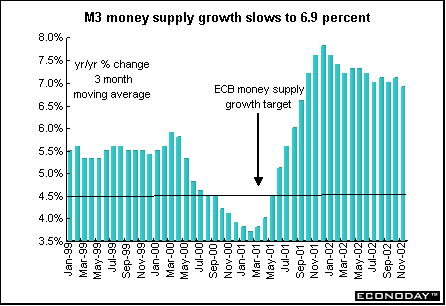
EU - January EU Commission economic sentiment index slipped to 98.4 from 98.6 in the prior month due to falling consumer and industry sentiment. Consumer confidence dropped to minus 17 from minus 16 in December while industrial sentiment dropped to minus 10 from minus 9. However, January construction confidence rose to minus 22 from minus 23 in the prior month, while services sector confidence - which is measured but is not part of the economic sentiment index - rose to minus 4 from minus 5 in December.
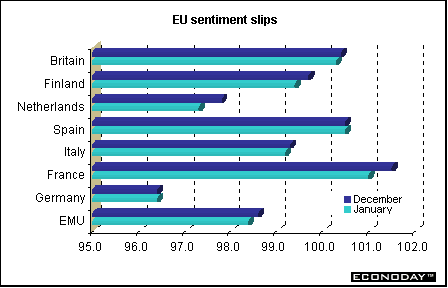
Germany - January Ifo Institute's west German business sentiment index posted a tiny rise to 87.4 from 87.3 in December. This was the first gain after seven consecutive monthly drops, as sentiment on both current business conditions and future expectations improved. East German business sentiment rose to 97.4 in January from 97.2 in December.
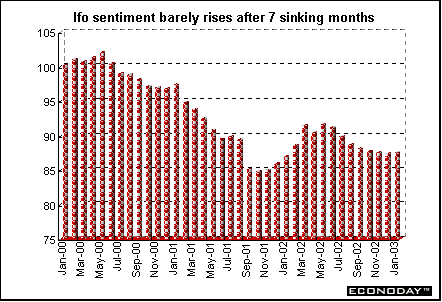
France - December producer prices jumped 0.5 percent and 1.7 percent when compared with last year. Excluding food and energy the PPI was unchanged and up 0.4 percent on the year. Energy prices rebounded 2.5 percent after a 2.8 percent drop in November. Fuel prices alone rose 6.3 percent on the month for a gain of 23.4 percent on the year.
December seasonally adjusted unemployment rose by 9,000, pushing the International Labour Organization unemployment rate up to 9.1 percent. The ILO definition of unemployment excludes jobseekers that did any work during the month.
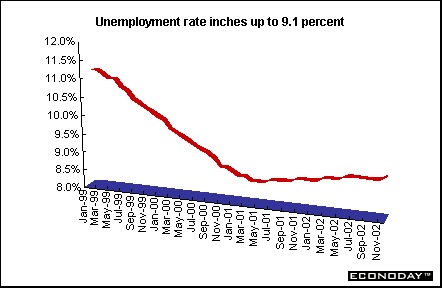
Italy - November world merchandise trade surplus was €733 million compared with a surplus of €1.389 billion a year ago. Imports rose 5.0 percent while exports abroad increased only 1.8 percent. The trade deficit with the EU only worsened to €1.034 billion from a deficit of €886 million in November 2001. EU exports rose 4.5 percent while imports climbed 5.4 percent. The December non-EU trade surplus was €1.735 billion compared with a surplus of €2.815 billion in December 2001. Non-EU exports dropped 3.7 percent while imports climbed 8.2 percent.
December producer prices rose 0.3and 1.5 percent when compared with last year. The increase was largely due to higher oil prices, which pushed up energy costs. Intermediate goods producer prices rose 0.4 percent and 1.6 percent on the year. Consumer goods were up 0.3 percent and 1.9 percent on the year, while investment goods were flat on the month, rising just 0.8 percent on the year.
Britain - January seasonally adjusted Nationwide house price index rose 1.7 percent and 26.5 percent when compared with last year. Concerns have been mounting among members of the Bank of England's Monetary Policy Committee about the high level of house price growth. Deputy Governor Mervyn King has warned that unsustainable increases in house prices and consumer debt pose a threat to economic stability in the future.
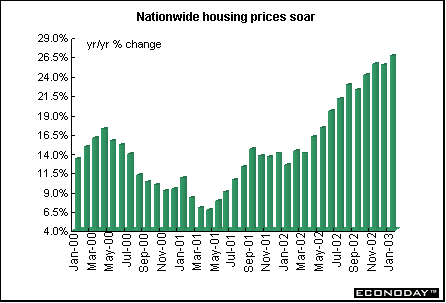
Asia
Japan - December seasonally adjusted merchandise trade surplus shrank to ¥657.3 billion ($5.6billion) from ¥1 trillion in November. Exports plunged 7.3 percent while imports rose 1.2 percent. However, the trade surplus expanded 19.9 percent when compared with last year. On the year, exports grew 15.1 percent, helping boost the surplus for the 10th consecutive month. But the expansion was narrower than expected as imports were also up a strong 14.1 percent. The politically sensitive trade surplus with the U.S. increased 18.6 percent from a year earlier.
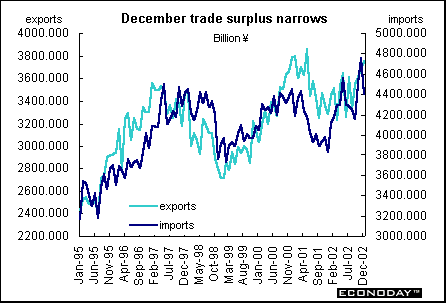
December seasonally adjusted retail sales fell 3.9 percent and 3.4 percent when compared with last year. This was the 21st straight month of decline on the year. For 2002 as a whole, sales sank 3.9 percent. Clothing and personal accessories sales fell 12.7 percent while auto sales rose 2.9 percent. Sales at large-scale retailers fell 4.2 percent on the year, after adjustment for change in the number of stores.
December seasonally adjusted industrial production fell 0.1 percent but rose 6.7 percent on the year. This was the fourth month in a row that industrial production has fallen. For all of 2002, production fell 1.4 percent, the second straight year of decline. Shipments fell 2.1 percent in December while inventories climbed 1.0 percent, indicating production may be outstripping demand.
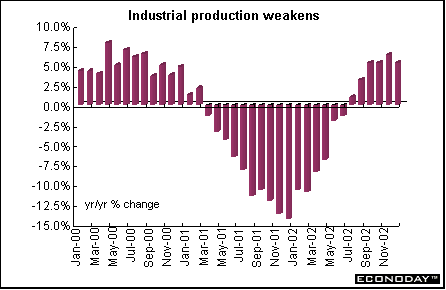
January seasonally adjusted Tokyo consumer prices were down 0.4 percent and 0.6 percent when compared with last year. Tokyo core prices, which exclude fresh food, also were down 0.6 both on the month and year. December nationwide CPI was unchanged but down 0.3 percent on the year. Nationwide core consumer price index was also unchanged on the month but fell 0.7 percent from a year earlier, marking the 39th straight decline and underscoring that deflation retains a firm grip on the economy.
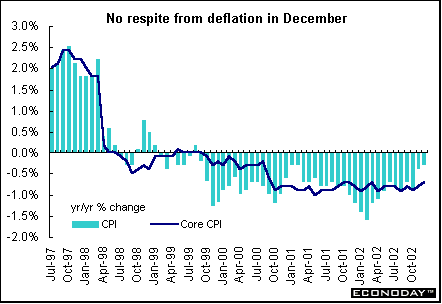
December unemployment rate rose to a record matching 5.5 percent from 5.3 percent in November. The economy added 10,000 jobs, while 80,000 people joined the workforce. December's rise was the third in four months. The total number of unemployed climbed for the 11th straight year in 2002 to an average of 3.6 million people. That put the average jobless rate at 5.4 percent for the year, up sharply from 5.0 percent a year earlier despite the rebound in exports and manufacturing. The data also highlighted the ongoing contraction in the work force as a whole. The average number of workers and job seekers fell by 630,000 people to 66.9 million in 2002 from a year earlier.
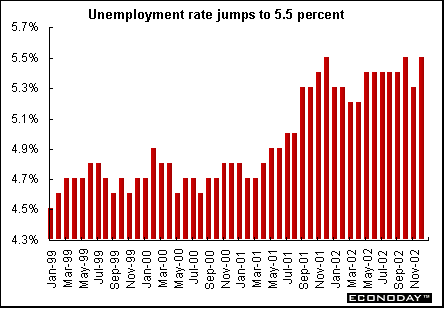
December seasonally adjusted spending by salaried workers fell 6.1 percent and 3.5 percent on the year. Wage earner spending is an important gauge of personal consumption, which accounts for more than half of Japan's gross domestic product. The seasonally adjusted propensity for wage earners to consume, a ratio that measures the amount of disposable income that went to household spending, rose to 74.6 percent from 71.9 percent in November.
Americas
Canada - December industrial product price index (IPPI) fell 0.4 percent but rose 2.8 percent when compared with last year. On a monthly basis, lower prices for motor vehicles and other transport equipment, pulp and paper products, chemical products and electrical and communications products had a major impact. Higher prices for meat, fish and dairy products and for fruit, vegetable and feed products partly offset these decreases. Strong contributors to the year-over-year growth were petroleum and coal products and primary metal products. However, lower prices for pulp and paper products and for lumber and other wood products dampened the increase. If petroleum and coal product prices had been excluded, the year-over-year increase would have been 1.6 percent instead of 2.8 percent.
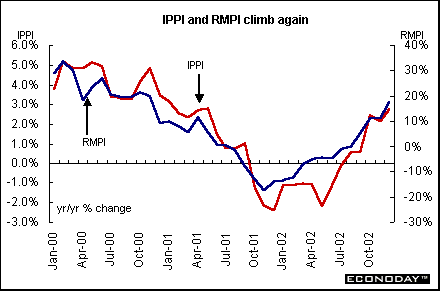
December raw materials price index (RMPI) rose 4.2 percent and soared 17.6 percent when compared with last year. Higher prices for mineral fuels and vegetable products, as well as for wood products and non-ferrous metals, were mainly responsible for this annual rise. If mineral fuels had been excluded, the RMPI would have increased 7.8 percent.
In December, the value of the U.S. dollar weakened against the Canadian dollar, pushing down prices of commodities that are quoted in U.S. dollars. As a result, the total IPPI excluding the effect of the exchange rate would have remained unchanged instead of declining 0.4 percent. On a 12-month basis, the influence of the dollar had no impact. The IPPI excluding the effect of the exchange rate would have remained at an increase of 2.8 percent from December 2001 to December 2002.
November gross domestic product at basic prices edged up 0.1 percent after a 0.3 percent increase in October. Retailing activity declined 1.1 percent, mostly because of a 3.5 percent drop in sales at new motor vehicle dealers. When compared with last year, GDP at factor cost slowed to an increase of 3.6 percent from the previous month's 3.9 percent rate.
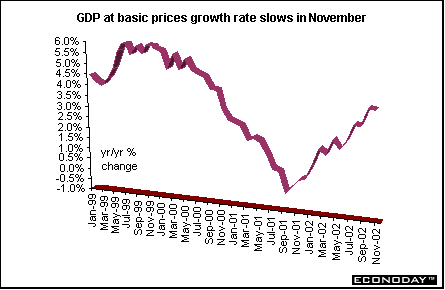


Last Week's Highlights • Global
Stock Market Indexes • Recap of Global Markets
• Currencies • Indicator
Scoreboard

The Bottom Line •
Looking Ahead
|